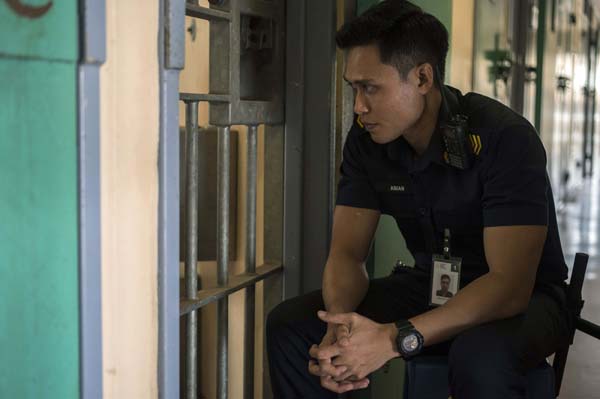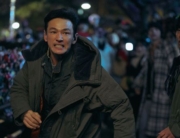Prison drama films, especially those striving for gritty realism, usually focus on the experiences of inmates, often through the eyes of the newly arrived prisoner learning how to survive in a violent, dog-eat-dog environment. However, Apprentice, the second feature by Singaporean filmmaker Boo Junfeng (Sandcastle), views prison life from a less explored angle: that of the corrections officers tasked with enforcing the rules and carrying out punishments.
Singapore is famously one of the safest places to live in the world. However, its citizens and tourists pay a very high price for that safety through that country’s infamously strict laws and regulations. The criminal justice system is particularly harsh, especially in its extensive use of capital punishment. Even crimes like drug dealing, which in most other places would warrant prison time or less, can be a capital offense.
On this matter, Apprentice casts an intensely questioning and sharply critical eye, underlining the devastating effects of this ultimate punishment on the families left behind and the prison staff charged with executing the inmates. As such, it’s rather remarkable that this film was selected as Singapore’s entry for the best foreign-language Oscar, following its Cannes premiere last year and subsequent film festival acclaim.
The film focuses on Aiman (Fir Rahman), a young corrections officer newly transferred to a maximum security prison. When he first arrives, he’s interviewed by his superior; when asked what made him choose this profession, he says he wants to “help people.” Unlike many of his colleagues, he can relate to the prisoners under his charge, because he knows he could have easily become one himself.
Aiman had a troubled upbringing, since his father, whom he barely knew, was incarcerated and later executed. He ran wild, joining a gang and taking drugs. Eventually he straightened up his act, going in the exact opposite direction, the military service and then working in the prison system, always struggling to escape from his father’s shadow.
Aiman’s diligence and seriousness eventually catches the eye of Rahim (Wan Hanafi Su), the prison’s hangman and chief executioner. Rahim has been doing this for 30 years, and prides himself on his self-described “humane” methods, making the death row inmates as comfortable as possible during their final days and killing them as quickly and painlessly as he can.
When his assistant suddenly quits, unable to handle the stresses of the job, Rahim taps Aiman to be his new apprentice. Aiman’s sister, Suhaila (Mastura Ahmad), already opposed to her brother working in the prison, can’t fathom why Aiman would want to be involved in performing the same execution method that killed their father. Also, Aiman’s moral and emotional quandaries engendered by taking this job are further complicated by a personal connection to the prison that he has been hiding from his superior. Although it explicitly takes an anti-capital punishment stance, the movie admirably refuses to vilify any of its characters. Its empathy encompasses all parties on both sides of the execution divide, and even someone like Rahim—whom it soon becomes clear is deluding himself about the nature of his work—is afforded much nuanced sympathy.
The film also excels in its attention to realistic details, especially in how prisoners are hung, from the precise measurements of the length and thicknesses of the ropes used to the precise placement of the noose. This, along with the finely honed performances, helps Apprentice successfully prioritize humanistic sensitivity over strident message-making.







Leave A Comment